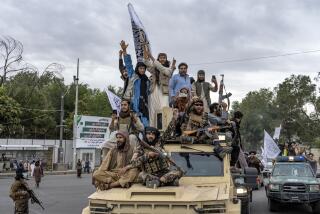Taliban’s Transparent Ruse
- Share via
The recent contradictory accounts by Taliban officials about their dealings with Osama bin Laden are best viewed as tactics to delay a U.S.-led campaign to disrupt or destroy networks of terror. Washington rightly shows no sign of falling for the ruse.
On Sunday the Taliban’s ambassador to Pakistan said Bin Laden was under Afghan government control. That was a reversal from the envoy’s previous statements that the regime did not know the whereabouts of the prime suspect in the terror attacks on the World Trade Center and the Pentagon. Or that Bin Laden might have left the country. Or that maybe the regime didn’t know where he was but could reach him by messenger.
The latest version from the ambassador, Abdul Salam Zaeef, was that the Taliban had been guarding and protecting Bin Laden for more than two years, since the United Nations called for him to be surrendered for his alleged role in the 1998 bombings of U.S. embassies in Kenya and Tanzania.
Though the Taliban periodically claims only to be protecting a “guest,” as required by Afghan hospitality, in reality it knows what it is sheltering. The U.S. government produced enough evidence in the embassy bombings that a federal jury in New York convicted four followers of Bin Laden last May. There are also ample grounds to doubt the truth of Zaeef’s latest statement. In light of the financial support Bin Laden has given the Taliban since moving to Afghanistan in 1996, when he was expelled from Sudan, it’s more likely he controls the Taliban than it controls him.
It is not surprising that the Taliban should try to delay U.S. retaliation for the Sept. 11 terror and offer negotiations perhaps, maybe, sometime in the future, about considering a handover of Bin Laden, though just as often it insists he will never be handed over. The regime should certainly be worried that many of its supporters would defect rather than fight both the United States and the Taliban’s enemies within Afghanistan.
The Taliban also seems determined to keep the focus on Bin Laden and the U.S. alone, but the campaign against terror is about much more. The Al Qaeda network, which extends to an estimated 60 countries, needs to be crippled as well. The campaign may start in Afghanistan, but it cannot end there.
More to Read
Sign up for Essential California
The most important California stories and recommendations in your inbox every morning.
You may occasionally receive promotional content from the Los Angeles Times.













